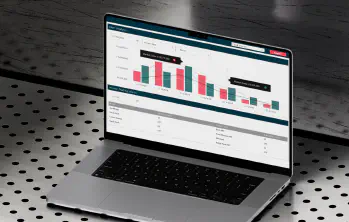RegTech Market Trends and Future Challenges: A conversation with eflow’s Head of Surveillance
As the tools and technologies available to bad actors continue to grow ever more sophisticated, RegTech providers are being forced not just to keep up, but to get ahead of the curve. To uphold market integrity, firms must have access to RegTech solutions capable of detecting potential market abuse, whatever form it comes in.
With the rapid development taking place in this field of technological evolution in the RegTech space, it’s imperative that firms remain educated on the latest technologies and how they can best be utilised in a surveillance context. To that end, we asked Head of Surveillance at eFlow Global Jonathan Dixon to offer his insights into the RegTech industry’s future, the challenges it faces, and the technological trends that are likely to shape its development. With over a decade of experience across multiple sectors—including client, vendor, exchange, and consultancy roles—Jonathan is well-placed to provide expert analysis on where RegTech is headed.
Key Market Trends Shaping the Future of RegTech
Looking ahead, two major trends will define the future of RegTech: increasing data processing power and the adoption of artificial intelligence (AI) for market surveillance. Jonathan highlights the growing ability of RegTech platforms to handle larger and more complex data sets, which will lead to enhanced detection of market abuse across multiple asset classes.
“As systems, processes and technology improve, we’re going to see the ability to process larger amounts of data,” Jonathan explains. “This will lead to capabilities that perhaps we couldn’t achieve before, like monitoring cross-product and cross-market events and seeing causal correlations between instruments in different markets.”
While the volume of trades might not increase exponentially, the complexity of the data that needs to be analysed will. This will require more advanced computing capabilities to identify patterns that indicate market abuse, such as layering, spoofing, or insider trading, particularly as they become more subtle.
Another crucial trend is the increasing role of AI in trading and market surveillance. Jonathan points out the potential risks that come with AI adoption: “Now, do I think AI is going to take over the world? No. Do I think it will have an impact? Probably, yes.” He refers to a study conducted by the Cornell Institute, where an AI trading algorithm in a closed environment, when given insider information, traded on it and then lied to its supervisor about engaging in insider trading.
This example illustrates the risks posed by AI, which may not always adhere to the ethical boundaries set for it. Jonathan adds: “There is also the capability of AI systems to talk to one another. Could three AI systems work together to manipulate the market in one direction so that one of them gains from it? That’s a risk we need to consider.”
Jonathan believes that RegTech will need to stay ahead of these risks by ensuring surveillance systems can monitor the collaborative potential of AI processes and their ability to manipulate markets.
The Evolution of RegTech in Digital and Decentralised Markets
As financial markets become increasingly digital and decentralised, RegTech will need to adapt to the unique characteristics of new asset classes such as cryptocurrencies. The nature of these markets, which operate continuously, presents new challenges for surveillance systems that are not built to handle 24/7 trading environments.
Jonathan shared his own experience in this space: “I worked for a big crypto exchange, and not every surveillance platform is capable of working 24/7. Crypto works around the clock, but if your platform has to reset for even 30 seconds at midnight, those trades during that window might not be counted.”
This highlights a key challenge for RegTech in the digital asset space. Traditional surveillance platforms were built for traditional markets with set trading hours. Digital assets, however, operate globally, 24 hours a day, making it essential for surveillance systems to be capable of real-time, continuous monitoring.
In Europe, the introduction of regulations such as the Markets in Crypto-Assets Regulation (MiCA) demonstrates the growing regulatory focus on digital assets. As Jonathan pointed out, “With MiCA, we have Title VI, which means that the rules pertaining to market manipulation, insider dealing, and market abuse will be live at the end of this year. There’s no grace period for it, so RegTech platforms must be ready.”
The ability to navigate these new regulatory frameworks and provide continuous surveillance will be a key factor in RegTech’s success as digital markets expand.
Challenges in Maintaining Market Integrity Amid Emerging Technologies
One of the biggest challenges facing the RegTech industry is staying ahead of increasingly sophisticated bad actors. As financial markets and trading technologies become more complex, the methods used by individuals and institutions to manipulate markets are also evolving. RegTech firms must ensure their surveillance platforms can anticipate and identify these new risks.
“Staying ahead of bad actors is invariably the toughest thing to do. You never want to be playing catch-up,” Jonathan said. “It’s about understanding the markets and what those risks might be.”
One example he gave was cross-product manipulation, where traders manipulate one asset class to benefit positions in another. “To give a really vanilla example, you might have a position in corn futures where you’re long. So at the end of the month, you buy a lot of corn on the spot commodities side, which improves your position on your long futures,” Jonathan explained. “Now apply that to more complex scenarios like oil futures and positions in Aramco. How do you monitor that?”
The answer lies in building more advanced surveillance platforms that can analyse multiple asset classes and identify these nuanced forms of market manipulation. As Jonathan points out, “Traditional surveillance, whether it’s on TradFi or digital assets, is more vanilla. We know what we’re looking for on a product-by-product basis. But when it comes to cross-product manipulation and larger data sets, that’s where it gets more complex.”
Emerging technologies, particularly AI, add another layer of complexity. Jonathan believes the industry must be prepared for scenarios in which AI systems may engage in unexpected market manipulation: “If an algo did it, you could look back and say it happened because of X, Y, and Z. Unfortunately, with AI, the system might not have quite so explicit an instruction, making it harder to understand why it acted that way.”
The Impact of Emerging Markets on RegTech Growth
Emerging markets will play a significant role in shaping the future growth of RegTech. As these markets develop and seek to attract foreign investment, they will need to adopt more robust regulatory frameworks to ensure investor confidence. This presents an opportunity for RegTech firms to provide the solutions needed to enhance compliance and surveillance capabilities in these regions.
Jonathan sees emerging markets falling into line with global standards to secure investment flows. “They’re going to have to fall into line, otherwise they won’t get the investment flow that they need,” he remarked. Standardisation and regulatory harmonisation will be critical to their success.
This alignment with global regulatory standards will drive demand for RegTech solutions that can support compliance across jurisdictions. As Jonathan points out, emerging markets will not only need to implement surveillance systems but also develop the capacity to handle the unique challenges that come with digital assets and complex financial products.
Geopolitical Influences on Regulatory Frameworks and RegTech
Geopolitical changes can have a profound impact on global regulatory frameworks, but Jonathan does not foresee these shifts fundamentally altering the RegTech industry. While sanctions and other geopolitical events create disruptions, the industry is well-prepared to manage these challenges.
“I don’t think the changing geopolitical landscape will materially affect the RegTech industry. If sanctions are imposed, we have the technology to deal with that,” Jonathan explained. “If Russia were prevented from engaging with global money markets, we’d have the capability to enforce that, even though it might be tough for the money markets.”
Sanctions and regulatory restrictions are not new challenges for the financial industry, and Jonathan believes that the RegTech sector has the tools to manage them. “We’ve dealt with sanctions and trading events for decades, centuries even. It’s not a new problem, and we’re prepared for it,” he said.
That said, RegTech firms will need to remain vigilant in monitoring attempts to circumvent sanctions and other regulatory restrictions. This will require continuous advancements in Anti-Money Laundering (AML), Know Your Customer (KYC), and Enhanced Due Diligence (EDD) solutions.
Conclusion
The future of RegTech will be shaped by significant advances in data processing, AI, and the digitalisation of financial markets. While these trends present exciting opportunities for improving market surveillance, they also introduce new risks that must be carefully managed. Jonathan Dixon’s insights highlight the importance of vigilance, adaptability, and innovation in navigating the rapidly evolving landscape of financial markets and regulatory frameworks.
Staying ahead of bad actors, anticipating new forms of market manipulation, and adapting to the unique challenges posed by digital and decentralised markets will be critical to the success of RegTech firms in the years to come. As the industry continues to grow and evolve, it will play an increasingly important role in maintaining the integrity of global financial markets.



